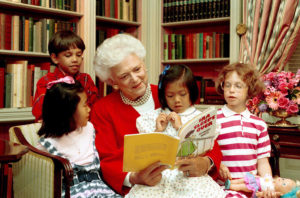1. The Barbara Bush Foundation for Family Literacy was one of first things Mrs. Bush did as First Lady
On March 6, the Barbara Bush Foundation for Family Literacy will turn 29, marking nearly three decades of helping to provide millions of Americans with access to books, reading, literacy and mentorship. The organization works with children throughout the K-12 system, with special attention on ages 0-8 and adulthood, while also providing mentoring opportunities for teens.
In fact, the foundation was created as one of the First Lady’s first official acts after moving into the White House in 1989, McFadden said.
Since its inception, its mission has remained the same: “focusing on the parent as the child’s first teacher.”
Four years ago, the organization moved from a private charity to a public foundation in order to further that mission, McFadden said.
“We realized the issues with literacy were so significant in this country that we really wanted to engage more people in the solutions,” she told the IMSE Journal.
Today, the Bush family still remains heavily supportive of the organization and continues to serve its mission, with Dorothy Bush Koch acting as the foundation’s honorary chair.

Mrs. Bush reads to children in the White House Library.
[Photo Credit: George Bush Presidential Library and Museum]
McFadden said the Barbara Bush Foundation is adamant that, like education, literacy is a “civil right” that inherently belongs to all Americans, no matter who they are or what their circumstances may be.
While those enrolled in the K-12 system typically have access to reading materials, online courses and specialized instruction, those resources are much less readily available for readers who fall outside the school-age group.
“We believe education is a civil right no matter your age; that’s a motto we say a lot,” the CEO said. “And what people really don’t understand is, if you’re younger than five or older than 18 how really challenging it may be to access education in this country.”
3. Parents are a child’s first teacher
A crucial aspect of the foundation’s core beliefs is the concept of “family literacy, or “focusing on the parent as the child’s first teacher,” according to McFadden.
One of the ways the organization works to position adults as literacy leaders is through its Talk With Me Baby online toolkit — a set of resources developed alongside Emory University, the Georgia Department of Public Health and more, which helps prepare nurses and other adults on the frontlines of family and education on how to help new parents facilitate literacy from birth.
But, while a study of over 700 parents by the Barbara Bush Foundation for Family Literacy found that 92 percent of survey-takers said they would be willing to be trained as a literacy tutor if their child was six months or more behind on reading — not all of those parents were able to read well, themselves.
4. But millions of adults living in U.S. have difficulty reading themselves
According to the Barbara Bush Foundation, a staggering 36 million adults living in the U.S. struggle with low-literacy skills, with about 25 percent of adults unable to read beyond the fifth-grade level.
The organization said it often works with “parents who have very low literacy skills themselves.” As of November, the foundation was ranked as the No. 1 provider of adult literacy services to parents who possess less than a fourth-grade reading level, it said.
“There’s a really significant focus on those 36 million Americans who are at that most basic level of reading,” McFadden said, especially because the parent’s role is so crucial to the student’s success in reading. For parents who have had barriers to education themselves, passing on literacy skills to their children is an even bigger challenge.
McFadden said her organization also points to a recent study from the Brookings Institution, which found that for parents without a high school diploma, less than half of their children will be ready for first grade. When a high school or college diploma is achieved, however, that number climbs.
“We really look to figure out …how do we ensure that those parents who have a high school education and get the best information possible on how to train their children, and parents with low-literacy skills, get that same information?” McFadden said.
Despite the reading challenges that millions of adults with children face, the overwhelming majority of those parents surveyed by the Barbara Bush Foundation said they were willing to do what it takes to gain the skills necessary to help their own child improve his or her literacy.
“They still wanted to help their child learn to read,” McFadden said.
Still, the number of parents with low-literacy skills is stark, with much work still required to help lower it, the foundation said.

Liza McFadden, president and CEO of the Barbara Bush Foundation for Family Literacy. [Photo credit: Credit: Barbara Bush Foundation for Family Literacy]
To do its part to combat the problem, McFadden said the Barbara Bush Foundation rolled out a $7 million competition that seeks to find developers to build new applications geared toward helping adults become better readers. Eight finalist apps are now being tested by adults with low-literacy skills.
5. Working at the Barbara Bush Foundation for Family Literacy is a “bibliophile’s” dream
McFadden, who heads the organization, said as an avid lover of books and reading herself: “There is no greater job on Earth than working with the Barbara Bush Foundation for that reason alone.”
Before coming to help the foundation expand its reach, McFadden had spent most of her career in the education realm, as well as worked in government and public relations, she said — all backgrounds that have prepared her for her dream job today.
One only needs to look back at the speech Mrs. Bush gave in 1989 when announcing the foundation to see what inspires McFadden to keep pushing for literacy, she said.
At its heart was a simple message McFadden said she lets guide her today: “If we could improve the literacy level of every man, woman and child in this world, isn’t that just about the best thing we can do?”
Learn more about what you can do to improve literacy for all using the Institute for Multi-Sensory Education’s Orton-Gillingham training.
